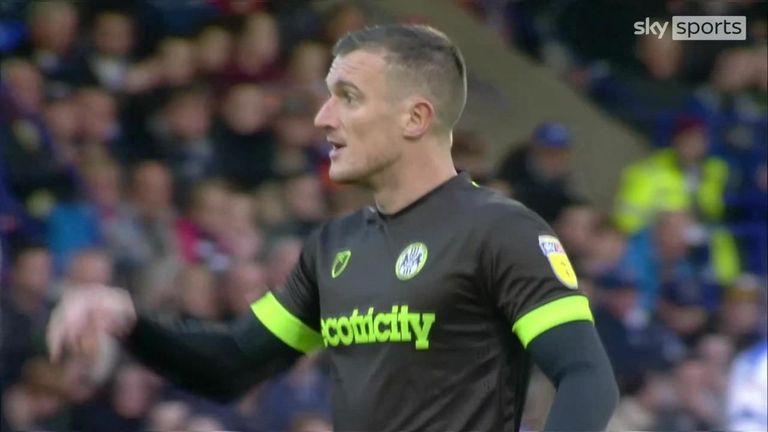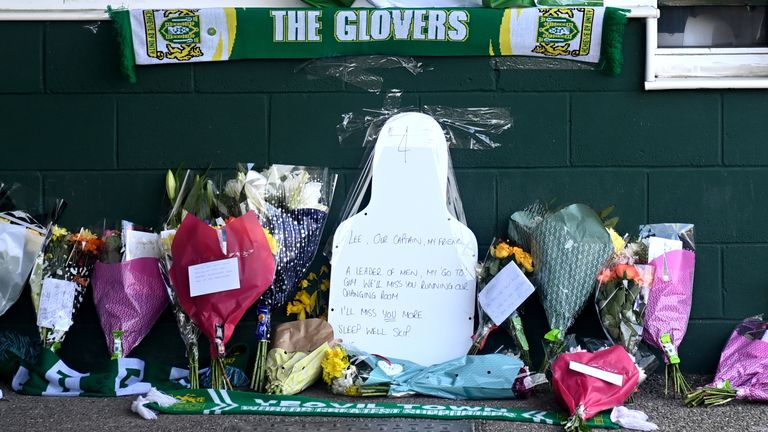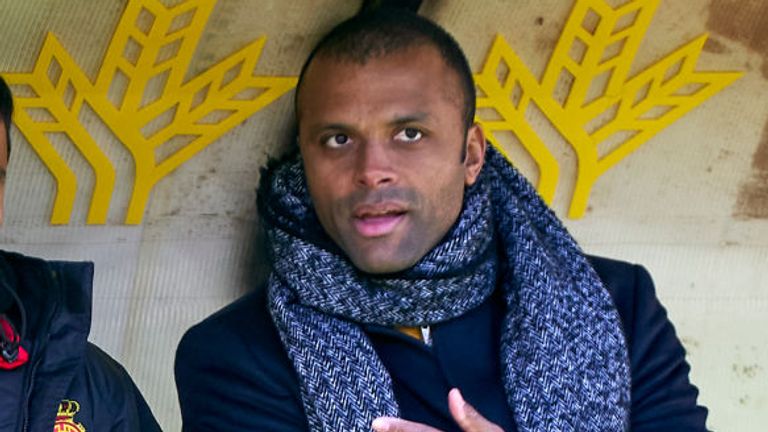Lee Collins: The widow of Yeovil Town captain says more needs to be done to support lower-league footballers
Rachel Gibbon: "All players play with players who are coming to the end of their career. For Lee, it was always on his radar. He wasn't naive enough to think this would go on forever. It was on his radar for two to three years, and he was very worried about it."
Sunday 22 August 2021 13:00, UK
The widow of Yeovil Town captain Lee Collins, who took his own life in March, has told Sky Sports News more needs to be done to support lower-league footballers as they come towards the end of their careers.
In her first interview since the tragedy, Rachel Gibbon says Collins, who played 470 English Football League (EFL) games for Port Vale, Barnsley, Northampton Town and Mansfield Town, was fearful of what his life would be like after football.
She says the ethos within the game is for players to be "strong men" and not open up about mental illness.
A coroner recorded a verdict of suicide last month after Collins was found dead in his hotel room in Yeovil in March.
"I received a phone call from a police officer asking where I was, because living in South Wales, she needed to send local police to me. And it was them that came and broke the news to us," Rachel told Sky Sports News.
"It hit me like a sledgehammer. When you get a phone call from a police officer like that - I explained I had three children with me, and she said she couldn't tell me what it was that had happened, but that I might want to take the children away for a while - so you instantly know it's something awful.
"Until the police arrive on your doorstep, there's still that tiny bit of hope that maybe it's something else. It's so backwards. You then start praying that maybe he's been in a car crash or something else equally awful. You never expect that in the slightest.
"It's been rough on our 10-year-old in particular, but all three children have been struggling, especially with separation anxiety. Whenever I leave them, they're wondering if mum will come back, because Dad went to work one day and never came home."
Collins contributed to the Professional Footballers' Association (PFA) throughout his career in the EFL but because he died while playing in the National League, his family was not entitled to the usual death-in-service benefit.
A memorial game for Collins is taking place in Stoke-on-Trent on Sunday - organised by former colleagues at Port Vale - to help raise funds for his family.
An open letter signed by his "friends and colleagues" was also sent to PFA chief executive Maheta Molango on Sunday morning, calling for an "extensive review into the current player wellbeing service offered by the PFA."
The letter's authors highlight what they believe to be a lack of "player wellbeing, mental health and post-retirement support" and accuse the PFA of failing to respond to the rise in mental health issues caused by the Covid pandemic.
It calls on the PFA to fund wellbeing officers at all member clubs, improve aftercare for retiring players and to provide death-in-service benefits to all members, regardless of which league they play in.
Rachel said: "All players play with players who are coming to the end of their career. For Lee, it was always on his radar. He wasn't naive enough to think this would go on forever. It was on his radar for two to three years and he was very worried about it. We would talk about it a lot. He didn't want to go into coaching and management, he didn't want the responsibility. He is too much of a joker to take on that role.
"He couldn't go and do a 9-5 office job, put on a suit and tie and sit at a desk all day. That's what he would discuss with his closest friends and team-mates.
"Lee was extremely unwell and those closest to him could see that he needed help. It's a cliche to say it's OK not to be OK, but it's true. As family and those closest to him, what do you do? He is a grown man of technically sound mind so you can't march him to a doctor's and force help on him.
"Having said that, Lee never had a doctor. He only had his club doctor and there is no way in hell Lee would go to his club doctor and say this, that this is where he was.
"I begged him to get help, begged him to speak to someone. I know his manager, his closest friends and team-mates talked to him, asked him to get help, but Lee being Lee, he had to be the strong man."
Rachel has now called on people within the game to be more proactive to the needs of footballers so that more can be done to help them going forward.
"They're not these big fancy superstars that earn mega bucks, these are just regular guys," Rachel added. "They could live next door to you. More needs to be done with those in particular. For Lee, he lived within his wage packet, so he didn't have a big nest egg of savings to fall back on.
"Football in general needs to be more proactive in helping those footballers, rather than what they are at the moment which is reactive.
"What happened to Lee is the worst possible scenario and obviously everything has been reactive to that. If there's things in place beforehand, be proactive - that's what these footballers, these men need."
In response to Rachel's comments and the letter written to them by those close to Collins, the PFA told Sky Sports News: "Our thoughts remain with Lee's family, friends and team-mates and we will continue to offer our support to all those affected by Lee's passing.
"Professional football can be a challenging career and we have identified a wide range of football-specific areas that can adversely impact a player's mental health. Career transition - whether through retirement, injury or release - is a particularly difficult time for players and their families.
"We are committed to continually improving our education and wellbeing support, which also includes evaluating the way football as a whole supports players.
"Any members who need support with their mental health, including issues both inside and outside of football, can contact us on our 24/7 helpline on 07500 000777 or at wellbeing@thepfa.com."
If you are affected by issues related to mental wellbeing or want to talk, please contact the Samaritans on the free helpline 116 123, or visit the website




